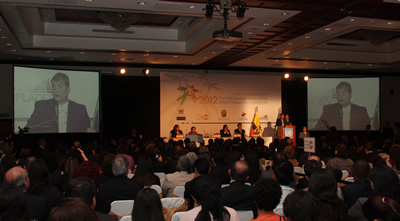Press Release
(6 July 2012) Member States delegates to the Economic Commission for Latin America and the Caribbean (ECLAC) concluded today, in Quito, Ecuador, the meeting of the ECLAC Ad Hoc Committee on Population and Development 2012 through the adoption of a set of agreements enshrining the new status of this intergovernmental advisory body and reaffirming the importance of reducing territorial inequalities for promoting sustainable development, among other issues.
At the meeting, which focused on population, territory and sustainable development issues, participants also discussed the Programme of Action of the International Conference on Population and Development (Cairo in 1994) beyond 2014 in Latin America and the Caribbean, and the Latin American and Caribbean Regional Plan of Action on Population and Development - drafted after the Regional Conference in Mexico in 1993 - in which the countries of the region agreed to facilitate integration and national experience sharing for formulating population policies and programmes.
Once the debates concluded, the delegates endorsed an agreement to rename the ECLAC Ad Hoc Committee on Population and Development as Regional Conference on Population and Development in Latin America and the Caribbean, which will take on the functions of the Committee and continue to fulfill its mandates. Furthermore, the delegates decided that the Regional Conference would create working groups on priority issues related to the population and development sector.
With this resolution, the new Regional Conference will be more autonomous and all its decisions will be considered at the ECLAC Sessions - the main institutional meeting of this UN regional commission - as well as by the United Nations Economic and Social Council (ECOSOC).
The delegates also called on ECLAC's member States to consider the importance of territory as a key element for sustainable development and for reducing territorial inequalities that fuel economic, social and environmental inequalities.
At the same time, they urged Governments to ensure that, in the formulation and implementation of development plans, policies and programmes at all political and administrative levels, account is taken of population dynamics, including changes in the age structure of the population, the spatial distribution thereof, and the medium- and long-term sectoral consequences of demographic change, bearing in mind the specific implications of such dynamics at the territorial level. Likewise, they exhorted Governments to advance towards the consolidation of planning systems that help to build equitable societies, free of social exclusion, by designing public policies geared to reducing gaps in the quality of life and in the exercise of the rights of all persons.
Recognizing that the eradication of poverty is a precondition for the three pillars of sustainable development -economic, social, environmental and their interlinkages- the delegates also urged member States to improve their sustainable development policies, foster energy efficiency and address the impacts of climate change, as well as to uphold, and build on, the achievements of the Programme of Action of the International Conference on Population and Development, and the targets of the Millennium Development Goals, in particular those relating to the following: guaranteeing reproductive rights and universal access to sexual and reproductive health, with emphasis on preventing adolescent pregnancies; the prevention and treatment of sexually transmitted diseases, in particular HIV/AIDS; and the universal provision of comprehensive maternal health services.
In another of the agreements, participants recommended to step up efforts to achieve gender equality, with emphasis on the physical autonomy of women, the eradication of all forms of violence and discrimination against them, access by women to stable jobs within the labour market, and the regulation and enforcement of laws enacted on gender equality.
The representatives also urged Governments to formulate strategies for developing a city system that encompasses territorial planning and environmental sustainability in order to promote orderly and sustainable urban growth.
On behalf of all the participating delegations, the representatives of Brazil thanked the Government of Ecuador for having hosted the meeting and congratulated the country for the successful event.
Finally, the delegates agreed that the first meeting of the Regional Conference on Population and Development in Latin America and the Caribbean be held in Uruguay in the second half of 2013. The main topic will be the Programme of Action of the International Conference on Population and Development beyond 2014, and its outcomes will inform the Forty-seventh Session of the United Nations Commission on Population and Development and the Sixty-nineth Session of the UN General Assembly.
See also:
For further questions, please contact ECLAC's Public Information and Web Services Section.
E-mail: prensa@cepal.org; tel.: (56 2) 210 2040.
Follow us on Twitter, Facebook, Flickr and YouTube.



